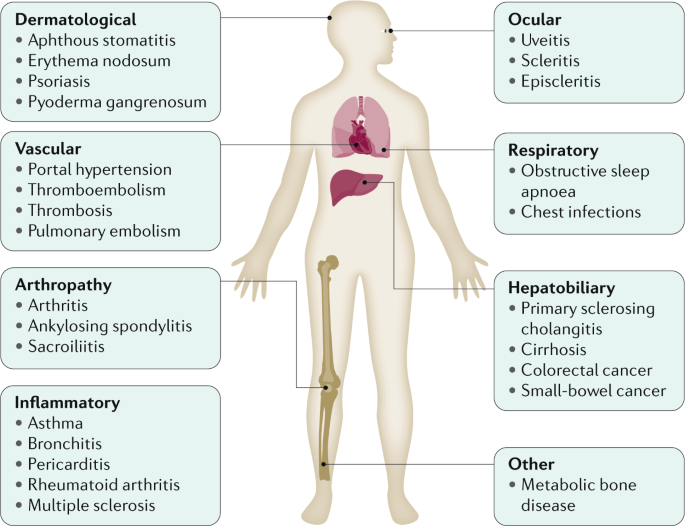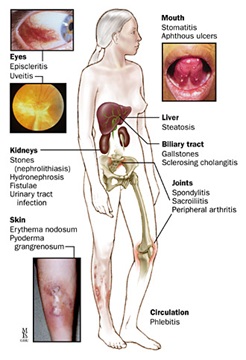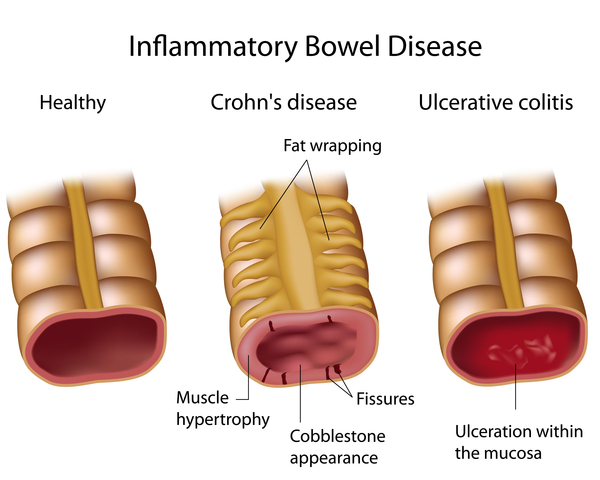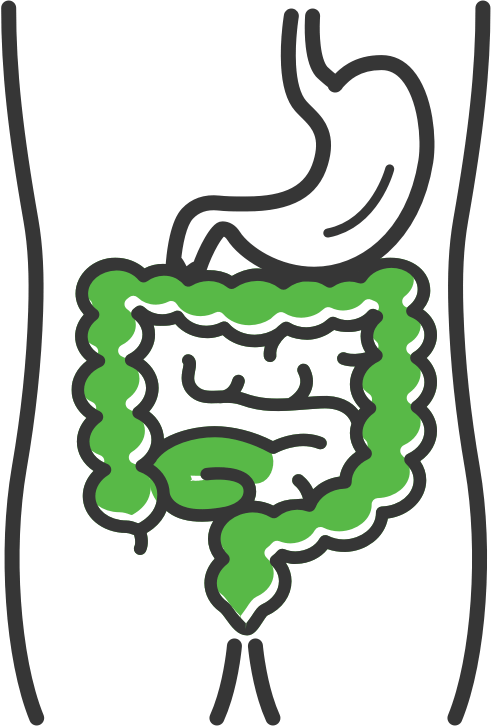Symptoms of Crohns vary widely depending on the person and on the part of the gastrointestinal tract or GI tract that the disease attacks. Who gets Crohns disease.

Crohn S Disease Nature Reviews Disease Primers

Know About Crohn S Disease Symptoms And Treatment Chennai Laser Gastro
Crohn S Disease Johns Hopkins Medicine
Symptoms often include abdominal pain diarrhea which may be bloody if inflammation is severe fever abdominal distension and weight loss.

Crohn's disease symptoms. The main symptoms of Crohns disease are. Fistulas infections that have tunneled from the abscess to a hollow organ such as the rectum or vagina. Symptoms include abdominal pain and diarrhea sometimes bloody and weight loss.
Although the cause is unknown doctors suspect a genetic influence since many members of the same family may be affected. Crohns disease might result from a complex interplay between genetic susceptibility environmental factors and altered gut microbiota leading to. Perianal disease is more common in Crohns disease than ulcerative colitis.
You suffer from Crohns Colitis or IBS but feel like you have a pretty good handle on your symptoms. Symptoms Causes The most common symptoms of Crohns disease are diarrhea cramping and pain in your abdomen and weight loss. The symptoms can vary depending on which part of the intestine the condition.
Unpredictable flare-ups and regular check-ups with your care team can disrupt school work and your social life. Crohns disease is a type of inflammatory bowel disease IBD the general name for conditions that cause inflammation in the gastrointestinal GI tractCommon signs and symptoms include abdominal pain and cramping diarrhea and weight loss. Crohns disease is diagnosed in about 1 in 10000 people every year.
In the lower GI tract or colon common symptoms. This immune system response causes inflammation leading to symptoms of Crohns disease. Symptoms vary and can change over time.
Coronavirus Now scheduling COVID-19 vaccines for ages 5 boosters and third doses. The periods between flare-ups are called remission. About 145 in every 100000 people in the UK have Crohns disease.
This can lead to various symptoms detailed below. Research has shown that if you have a parent or sibling with Crohns disease you may be more likely to develop the disease. Crohns disease sometimes runs in families.
Experts continue to study the link between genes and Crohns disease. Crohns disease is a type of inflammatory bowel disease IBD that may affect any segment of the gastrointestinal tract from the mouth to the anus. But it usually affects your small intestine and the beginning of your large intestine.
When the symptoms come back its called a flare-up or relapse. This is the most common form of. Types of Crohns Disease.
Other general symptoms include feeling tired nausea and loss of appetite fever and anemia. Crohns disease is progressive. Living with Crohns disease can be difficult at times.
Other complications outside the gastrointestinal tract may include anemia skin rashes arthritis. Swollen skin tags around the anus that appear to be haemhorrhoids but are not. Abscesses bags of pus created inside the body as a result of infection.
Crohns disease is a type of inflammatory bowel disease. It can affect any part of your digestive tract which runs from your mouth to your anus. While theres no known cure for Crohns disease therapies can greatly reduce its signs and symptoms and even bring about long-term remission and healing of inflammation.
Crohns disease shares many symptoms with other common conditions such as ulcerative colitis irritable bowel syndrome gastroenteritis and coeliac disease. Crohns disease is a chronic disease that causes inflammation in your digestive tract. Crohns disease is a lifelong condition with flare-ups from time to time.
Living with Crohns disease. Crohns is a chronic disease which means patients will likely experience periods when symptoms are active known as flares followed by periods of remission when you may not notice any symptoms at all. However Crohns is a progressive disease that starts with mild symptoms and gradually gets worse.
Crohns disease CD is a disorder of unknown aetiology characterised by transmural inflammation of the gastrointestinal GI tract. Crohns disease is a chronic or long lasting disease that causes inflammation and irritation in your digestive tract. Crohns disease appears early in life.
But if symptoms are well controlled you can live a normal life with the condition. Crohns is a progressive disease that can gradually worsen over time. Learn more about Crohns treatments and statistics.
Without treatment symptoms of Crohns disease can be constant or may come and go every few weeks or months. Crohns disease is most likely to appear in people aged 1530 or 4060 yearsHowever it can start at any age. Diarrhoea which may come on suddenly.
Crohns disease is a chronic inflammatory disease of the gastrointestinal tract with increasing incidence worldwide. If you are diagnosed with Crohns disease its important to know which part of your GI tract is affected. While symptoms of Crohns disease can vary from person to person the type of Crohns you have impacts the symptoms and complications you may experience.
Crohns disease is a chronic inflammatory bowel disease IBD that can cause you to experience symptoms like diarrhea stomach cramps rectal bleeding and weight loss. Crohns disease is an inflammatory bowel disease IBD. Your doctor will probably examine you and take a detailed history of your symptoms to help rule these out.
Crohns disease can be both painful and debilitating and sometimes may lead to life-threatening complications. Of course you have to admit you have the occasional slip ups but you know yourself well enough to get back on track. Yes you know that gluten leaves you miserable and switching between constipation and severe diarrhea.
CD may involve any or all parts of the entire GI tract from mouth to perianal area although it is usually seen in the terminal ileal and perianal locations. Crohns disease is a chronic inflammatory disease of the digestive tract. With perianal disease a person could develop.
But this time on your vacation to Italy with its glorious pasta and. The flare-ups vary in frequency and severity. But when theres excess inflammation that doesnt go away it can trigger Crohns symptoms.
What is Crohns disease. Inflammation is your bodys normal reaction to protect itself from bacteria and viruses. While it is important to recognize the signs of Crohns disease only a doctor can confirm a diagnosis.
The stages of Crohns range from mild to moderate to severe. Approximately one-sixth of patients have symptoms before 15 years of age.

Crohn S Disease Severity Amplified By Fungus
1

Inflammatory Bowel Disease Ulcerative Colitis And Crohn S Disease
/crohns-disease-symptoms-5b310ede0e23d90036925980.png)
Crohn S Disease Signs And Symptoms

Crohn S Disease Symptoms And Types And How They May Affect You

Crohn S Disease Symptoms Causes Gauri Urogynecology Clinic

Presenting Symptoms In The 96 Patients With Crohn Disease Download Table
:max_bytes(150000):strip_icc()/risks-of-untreated-crohn-s-disease-4707022_FINAL-0c4c4c50d40441399a7089d4d23ab812.png)
Risks Of Untreated Crohn S Disease
